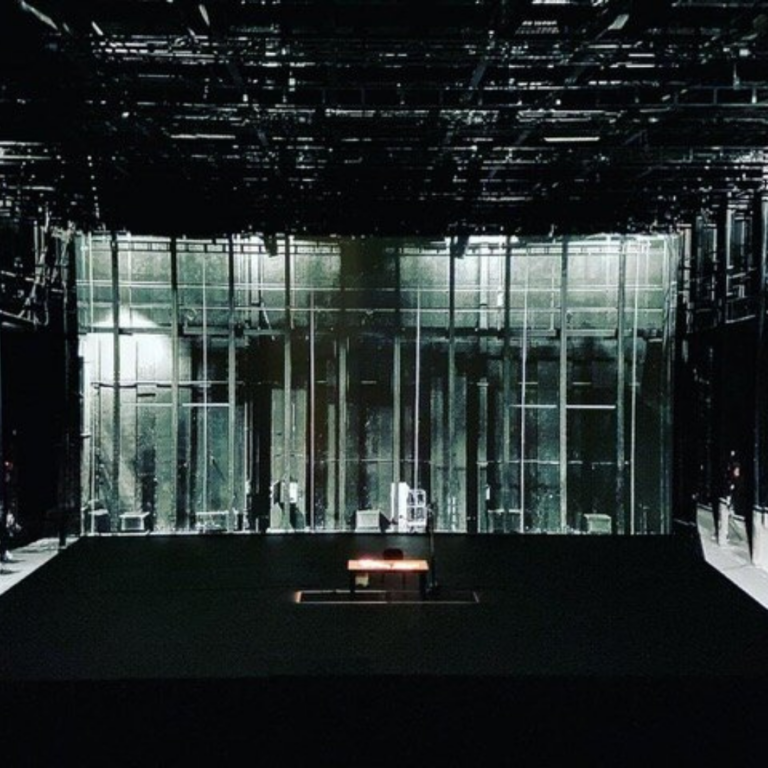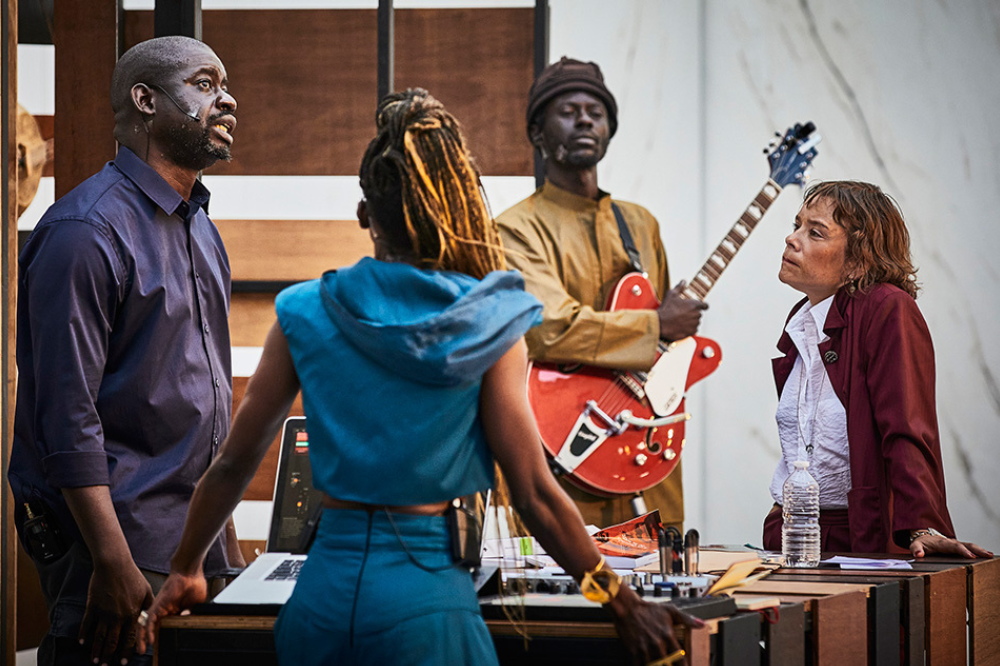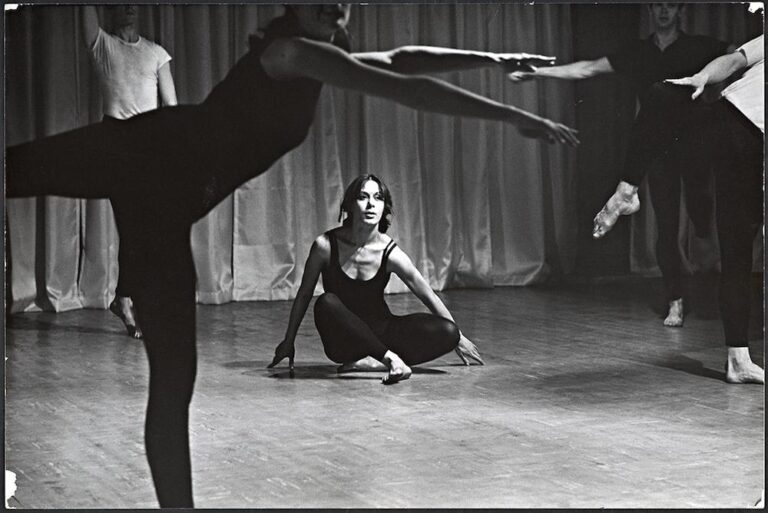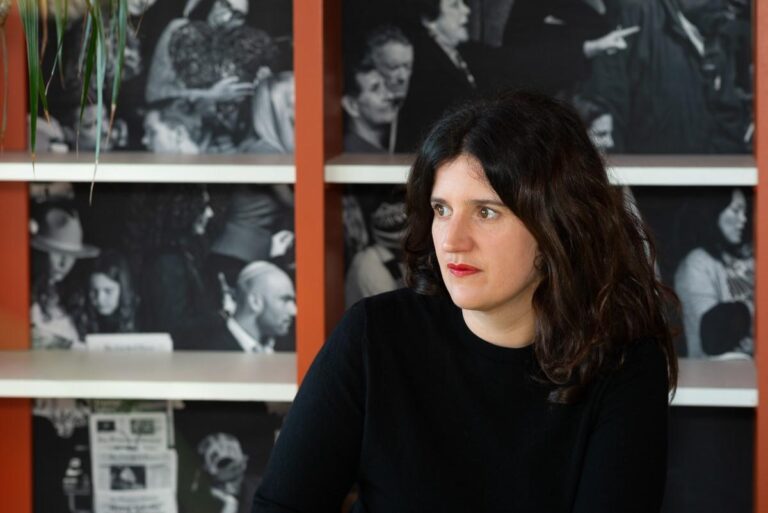
Felwine Sarr: Reinvest History and Utopia

© Christophe Raynaud de Lage for Festival d’Avignon
By Anne-Gaëlle Saliot
A philosopher, economist, writer and musician, the Senegalese Felwine Sarr is one of the most prominent intellectual figures of the moment. In recent years, his work has taken on a new form: that of plays. Two of them are currently on tour in the United States, and carry this singular voice that invites us to believe in the possibility of utopia.
On September 19, your plays Traces – Speach to African Nations and Freedom, I’ll Have Lived Your Dream until the Last Day began to tour in America. They will be played in New York, Princeton, The Georgia State University in Atlanta, and at Duke University in Durham (where you became an Anne-Marie Bryan Distinguished Professor in French and Francophone Studies two years ago). That brings me to a first question about your arrival in the United States, so that you can tell us a bit more about your extensive travels, as you have been extremely active on the African and European continents. The report on the restitution of looted art that you co-authored with Benedicte Savoy and presented to the French president, Emmanuel Macron, in 2018 had a huge impact in France and, more widely, in Africa and Europe. It profoundly altered European and museum perspectives on this postcolonial subject. Consequently, how do you consider the transfer of your teaching and art research activities to the American continent?
I arrived at Duke in 2020, in the middle of the Covid-19 pandemic, at a time when I was no longer really active in Senegal. I had already spent a year in Nantes, in 2017 – 18, then a few months in residency in Cassis, which is where I received the offer from Duke University. It arrived at the right time, and I accepted it mainly because I was keen for a change of discipline – to get out of economics, which had become too confined a space for my preoccupations. I also wanted to take a step back in relation to my native continent, and to my epistemological spaces, Europe and Africa. Once I got here, the question arose of how I could continue all the things I had undertaken and that were important to me, such as the Ateliers de la pensée in Dakar, Senegal. I soon realized that I could start to observe and build from another place, adopting what I would call a “triangular” perspective. I could finally step outside the face-to-face between Africa and Europe, and shift my gaze. As regards research, Duke turned out to have a Department of French and Francophone Studies with very diverse profiles, the American mix probably allowing for greater epistemological openness. Lastly, I could leave behind the often distorted debates on decolonial thinking in which France has been mired in recent years. So, for all those reasons, I was keen to move on, in both disciplinary and geographical terms, and to embark on a new adventure. The opportunity arose, and I seized it.
You are an economist, but also a writer, a musician, and a poet. Your entire body of work aims to break down the barriers between different forms of knowledge, to forge new relationships and encounters, spark shocks, expose overlappings, create points of contact… How did you come to playwriting? Your previous publications were essentially poems, meditations, and what might be described as a philosophical novel with Dahij (L’Arpenteur, Gallimard, Paris, 2009), hybrid genres, all. But before We Call It Love, your play on Rwanda, you had never tried your hand at drama. How did you discover this kind of writing, approach it, make it your own? It is obviously a very different type of exercise, as writing for the stage involves considerations of voice, orality, the body
I came to it through an encounter. It all began with my interest in the genocide of Tutsis in Rwanda. A number of African writers had been to Rwanda in 1998, as part of the Rwanda : écrire par devoir de mémoire project, to collect testimonies and make them into a work of literature, in order to leave a trace. I had already traveled to Rwanda several times; I was circling the issue, but didn’t know how to approach it. A playwright friend of mine, Carole Karemera, gave me the key by telling me the story of someone in her immediate circle and inviting me to write a play about it, which became We Call It Love. At her invitation, I went to Kigali for the writing process, which took me about ten days, before staging the play. That’s how it all began. So it’s thanks to her that I wrote that play, that I got started on playwriting.
We Call It Love isn’t part of the tour, but Traces – Speach to African Nations and Freedom, I’ll Have Lived Your Dream until the Last Day are. This is the first time your plays have toured in the United States. How would describe them briefly to an American audience?
I would say that Traces is, first and foremost, a speech to the youth of Africa. It is rooted in the same metaphorical world as my book Afrotopia (University of Minnesota Press, 2019), and takes up the same theme, but through a gesture that I intend to be symbolic and mythological. The idea is to “re-tell” the continent’s long history through the various tribulations it has undergone, but above all, to address a message to young people, telling them that we must heal, keep broadening our paths, turn toward the sun, and continue the task of self-creation; that their history is not limited to its dark or depressing episodes, and that they have the possibility, duty, and vital energy to become subjects of their own destiny again. That is the real message, to insist on the nascent forces, the potential, and the dormant strengths that need to be brought to the surface to become fully operational. As regards the form, I wanted to base it on a language that is not rooted in factuality, but in poetry and legend, making it possible to return to the text in the future without the message becoming dated. Basically, Traces is a reflection on our relationship with history and utopia, which leads to the following question: how can we reinvest history and utopia without harking back to a mythological or mythologized past? How can we use the traces of past experiences to open up new futures?
My other play, Freedom, is based on a totally different approach. René Char is a great master, a poet I love, whose work I have enjoyed for years and whom I also admire for his political activism during the dark days of Nazism. Leaving the world of literature behind, he committed himself body and soul to the French Resistance. But, while reading Frantz Fanon, I realized that there were links and resonances between the two authors, particularly in their anti-Nazi commitment. They saw literature as an insufficient response to violence and bloodshed, and felt the need for another type of commitment, though both returned to writing afterwards. So my play is an attempt to create a dialogue between two different paths, views of literature, poetry, commitment, and the role of the written text in the context of a politically active life.
Traces and Liberty have fundamentally different tones, if only in terms of language. As you said earlier, Traces is a speech, an address. It was a commissioned play, which premiered at the opening of the Museum of Black Civilizations in Dakar, but it speaks to much of your oeuvre, which endeavors to reflect on a contemporary utopia, recreated for a new century. Freedom belongs in a far darker dimension and resonates very strongly with the present day. It introduces two voices that meet and overlap, each with its own specific texture – the language of Char has an essential density and touch of esotericism, while Fanon’s is far more articulate. How did you consider the intertwining of the two voices, and the way they interweave with your own?
First of all, I had to render Char’s language, yet make it less abstruse. That involved a great many decisions, making cuts in his texts to keep only the parts I found the most explosive and luminous, the least obscure… but without destroying its essential opacity, which I obviously had to respect. And what interested me about Fanon was that his texts are neither literary nor written for the theater, yet I found there was something about his prose that lent itself to an oral address, to the transformation into oral literature. The reason became clear to me while I was working on it, because The Wretched of the Earth was dictated in a form of urgency. Knowing himself to be terminally ill with leukemia, he paced around the room and dictated the text to his wife, Josie. So there was a form of orality from the initial writing stage – a writing marked by repetition, redundancy, a breath that is less apparent in Black Skin, White Masks. I think the essence of my work hinged on that, on my ability to create a dialogue between them while respecting the integrity of their language, finding spaces where their individual linguistic worlds and gestures could connect. My role in all of that was evidently to intercede between the two, and as their preoccupations resonate with me, I was able to weave a dialogue into the text.
Both plays will be performed in French and surtitled in English, which is obviously a means of preserving the musicality and specificity of the languages and voices. But how do you think such plays, each with its own specificity, can be perceived and understood by American audiences? Young audiences, I might add, as, of the four institutions that will host them, three are universities. How will these texts be apprehended by young Americans? I’m thinking of Freedom, as Char is obviously less well known than Fanon in the United States, and the encounter between the two may surprise and disconcert spectators. How do you think they will react?
I think what will be interesting for me is to see to what extent these plays can cut across what I call “original and ethnographic cultural worlds.” Traces is rooted in Africa. How will it resonate with an audience of young American students? Maybe through the question of utopian consciousness and the invention of futures, questions that are of universal significance. I also wonder about the significance of an issue that is essential for young Africans – that of emancipation. Do young Americans share the same interest, in the same terms? Or have they perhaps put that issue behind them?
For Freedom, it seems to me that political engagement is a timeless issue. And so is violence, which is strongly present and will no doubt find an echo in the American social context and its recent history. And there’s something else: I am delighted that, through Fanon and his reputation here, Char can become visible, in a way that transcends the racial issue. These two men – Char who is white, and Fanon who is mixed-race, black or non-white (whatever the preference) – fight the same fight, share the same preoccupation, are impelled by the same spirit, and I think what that dialogue reveals in an American context – which is fascinating – is the trans-racial nature of political engagement, of the relationship to the world and to freedom, rather than restricting it to the issue of race. I think the dialogue between these two writers expresses that. It reveals the extent to which they converge and echo each other, in spite of their singularity.
We should also talk about the music, which has a key role in both plays. In Traces, Simon Winsé plays various traditional instruments: a kora, a n’goni, a flute. The speaker’s voice and the speech constantly resonate with the music, which is probably not a coincidence, since you’re a musician yourself. The same combination of voices and music (similar to Afrobeat) is also present in Freedom, featuring Majnun and T.I.E. Can you tell us about the place, role, and purpose of music in your playwriting?
In Traces, I wanted to recreate a form of speech that is part of the West African world, in which the instrument, whether it’s the kora or the n’goni, alternates with the speaking voice in a game of question and answer, with echoes, words and counter-words, pauses and musical phrasings… The voice has time to resonate, the music gives meaning to what the text is saying in a different way. That is what usually happens at West African gatherings, where music is a great medium. Aristide Tarnagda, the play’s producer, wanted to stage that form of speech and demonstrate its efficiency. The use of melodic rather than harmonic instruments was a judicious choice, a means of echoing Etienne Minoungou’s voice.
We took a very different approach in Freedom, as the idea was to make it a musical tale. So T.I.E., Majnoun and I gave a lot of thought to the musical style that would best link the voices of Char and Fanon – which are musical in themselves – and my own. I think they really managed to capture the essence of the message, with a variety of musical compositions including Afrobeat, but also the occasional hint of techno, and songs that are a lot more folk in style… a mix of different musical styles that create an atmosphere suited to the moments of dramatic tension. I can tell you that was no easy feat!
There is another element that differentiates the two plays: Traces is performed by an amazing professional actor, Etienne Minoungou, whereas Freedom brings professional and non-professional actors and musicians together on the stage – and in fact, you are one of the non-professional actors. Why did you decide on that method, which has already been used in theater of course, but which engages the body differently, and presupposes a different style of acting, a different mise-en-scene, and a different reflection on theatricality?
It was actually the result of lengthy discussions with the director, Dorcy Rugumba, who made that particular decision – which I confess I wasn’t too keen on at first, probably because I had no real desire to go on stage and play that part. He eventually convinced me that it would be beneficial to the play, through a form of incarnation between non-acting and the speech. But there were still a few tricks to learn: the relationship to body, voice, presence… There was something else as well, something related to real life, naturalness, the personal experience that the person on stage allows the audience to see. The director also wanted to steer me away from the cerebral, the intellectual, and challenge me to dare a form of nakedness, verbal expression, and self-unveiling in a space – the theater – that I find uncomfortable. It’s not where I feel at home, so I had to summon up a different part of my inner self, put myself at risk, in a sense. But I enjoy challenges, so after some initial reluctance, I decided to try it.
Felwine Sarr is a Senegalese academic, writer, and musician. Since 2020, he has taught contemporary African and diasporic philosophy at Duke University in North Carolina. His academic work focuses on the ecology of knowledge, contemporary African philosophy, economic policy, epistemology, economic anthropology, and the history of religious ideas. With Senegalese writers Boubacar Boris Diop and Nafissatou Dia, he is the co-founder of the Jimsaan publishing house. Felwine Sarr makes literature a vital necessity, a work of light and freedom. In 2022, he published Les lieux qu’habitent mes rêves, a meditative and initiatory novel.
Anne-Gaëlle Saliot, Ph.D., is Associate Professor of Romance Studies and Core Faculty of the Arts of the Moving Image program at Duke University. A French native, she was first educated in France at the Lycée Henri IV (Paris) and the Sorbonne, before receiving her DPhil. from Oxford University in the U.K. She then went on to lead an academic career in French Studies in the U.S. She previously taught at the University of York (UK) and the Johns Hopkins University before coming to Duke.
“Liberté: I Will Have Inhabited Your Dream Until the Last Evening”, Page Auditorium, Duke University “Traces: A Speech to African Nations”, Rialto Center for the Arts, Atlanta, GA

